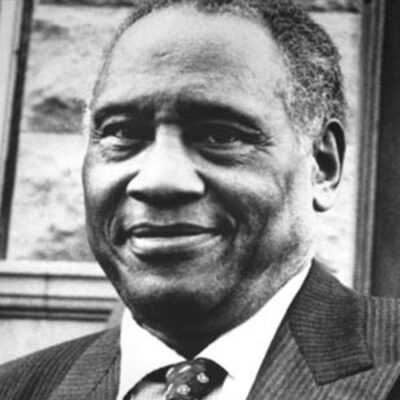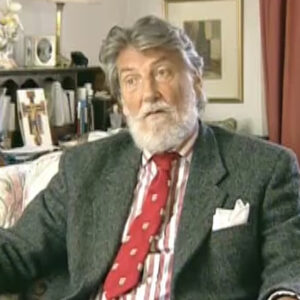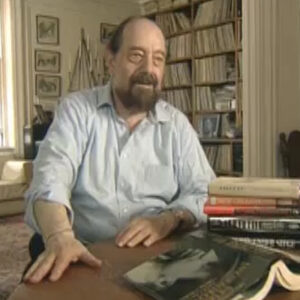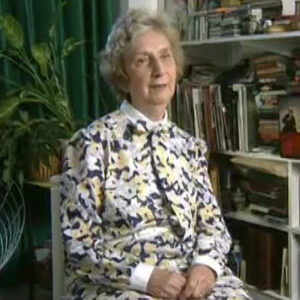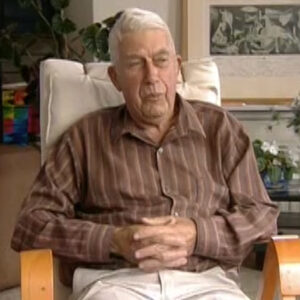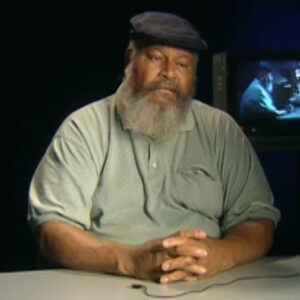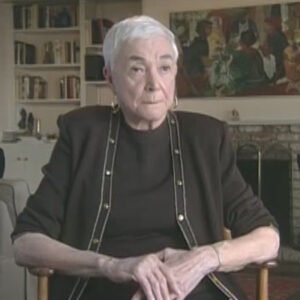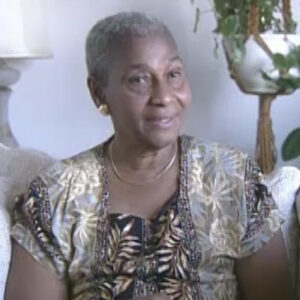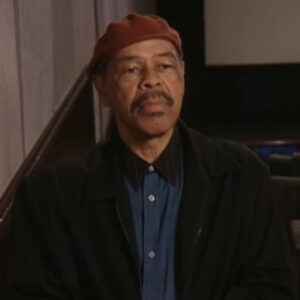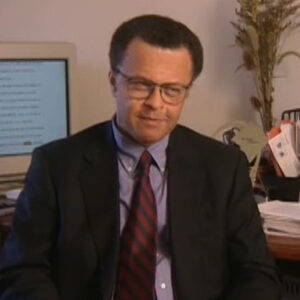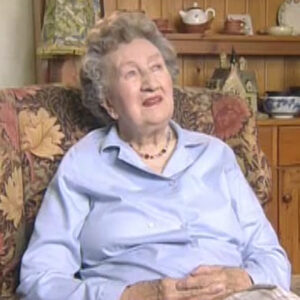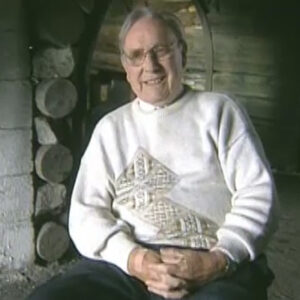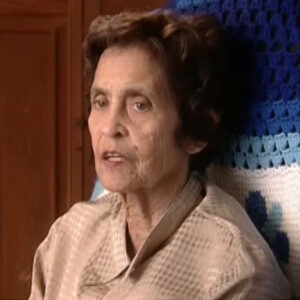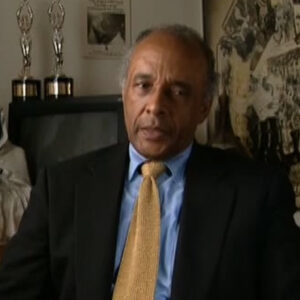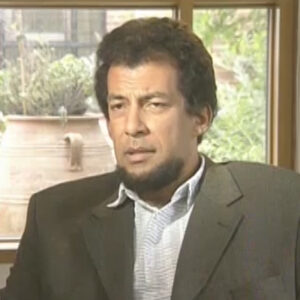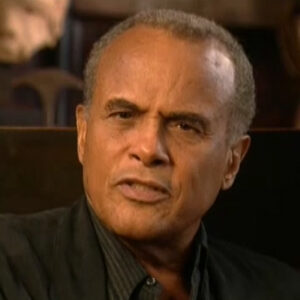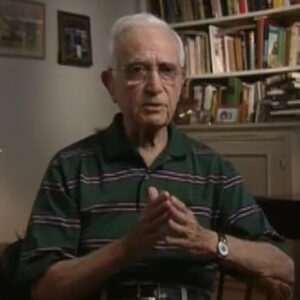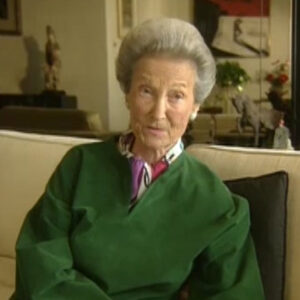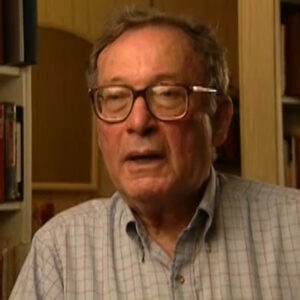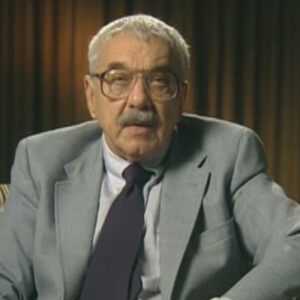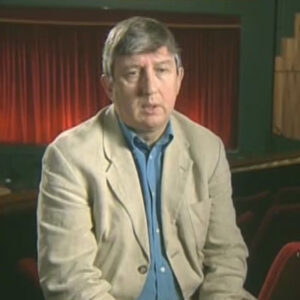Speaker The first time. I saw Paul Robeson on the stage as an actor.
Speaker I don’t think I ever saw Paul Robeson on stage as an actor. Hmm. When he did Othello, I was overseas. So as an actor, I only encountered poor and motion pictures.
Speaker Uh huh.
Speaker Now you’re an actor, so, you know, you can read it remains to be seen.
Speaker Yeah.
Speaker So, OK, so looking at him, you know, on on on the on the screen, you know what I mean?
Speaker Give me a real pretty direct. What did you think of him as an actor.
Speaker What did I think of Paul Robeson as an actor. Right. Well, the question is relevant to me, primarily because it forces me and everyone else to go way back and say, what is an actor in the first place? What function does he or she serve? What’s it all about? The only true way to compare an icon like Robeson is to compare him to himself. What was his potential? To what degree did he recognize or, you know, arrive and what he might have been? Paul Paul came along when the meaning of acting altogether was somewhat different, and for us black folks, almost totally different. What was his assignment as an actor? What was the assignment of the black actors who came along when he did? We had to present a face of our people in an effort to reinstate our dignity and to establish an identity that said to the world, we are human beings. So, Paul, as an actor, as a singer, as an artist, responded to the challenge in that fashion. So when you look at Paul as an actor, you have to understand the particular burden he carried as a performer and why he carried it and what the object was. Now, Paul, if you were comparing with some of the actors today would not measure up in the same way as somebody who was who is specifically an actor who is trained and as a technician and deploying his voice, his face, his persona, and an imaginary portrayal meant to influence the public. Paul was larger than that. He had more to accomplish than that. And the wonderful thing is, for all the technical excellence of today’s craft and actors, very little that they do, even the greatest of them will stay with us even before we get beyond the popcorn in the theater. Paul, even in his roughest, you know, had an impact that you couldn’t forget. Paul and his mistakes was more eloquent as a performer than most of us at our best. But to thoroughly understand him as to understand his acting as a part of the struggle in which he was engaged to vindicate the dignity of his people and to establish wider parameters for what we mean when we say human being. All of this, he consciously assumed that’s his responsibility. I didn’t always you didn’t always succeed, of course. And he succeeded in some instances more than he did in others. But that was his assignment. And the question becomes frivolous, unless you put that as a part of the context and very well.
Speaker But with that framework in mind, uh, let’s say when you were in how it was Robeson’s impact as an actor, as a singer, was it recognized and acknowledged and imitated or at least it happened?
Speaker Well, let’s establish when I was that how I came to Howard in 1935, I left Howard in 1939, the year Paul Robeson came back from Europe because of the war. I Robeson at that time was known as an international star.
Speaker Singer, the best we had on stage, on screen anywhere, he definitely was a part of what we meant as students when we said that we wanted to be great, we wanted to be somebody that meant for us. We wanted to be like Paul Robeson. And there were three or four icons who had that immediate international appeal. Paul Robeson was one. Joe Lewis was one, Marian Anderson was one. These were the people who constituted a language which we could use to communicate with each other.
Speaker When we said Paul Robeson, it meant excellence. It meant black, black folks, given an equal opportunity, could shine. And that’s what Joe Lewis meant. That’s what Marian Anderson meant. And Paul, I suppose, meant it most of all.
Speaker Uh, was there any particular way that you attempted to incorporate his greatness in your art or in the building of your art as you were as you began to do it? Did you were there any particular technique or was it just general impact?
Speaker That was no technique that I saw in Paul’s work that influenced me as an actor in the first place. I wasn’t an actor. I didn’t want to be an actor. It was never my intention to be an actor. And I think I have succeeded in not being an actor. What I want is to be desperately was a writer. And the amazing thing is that all the time I was at Howard, I never saw stage play. As a matter of fact, Dr. Alain Leroy Locke, who was my professor and head of the philosophy department, Black Rhodes Scholar, asked me into his office one day to find out what I wanted to do with myself. And when I told him I wanted to write plays, he was astounded. He said, Where are you from, David? I said, Waycross, I believe.
Speaker I said, Waycross, Georgia. So I don’t mean what town. I said, Well, that’s the name of the town, is it? What have you ever been in the theater? Oh, yes. Saturday nights we go to see the Cabaret Pixies, is it? No, no, no. I mean a stage with live people. I find it. I said no, sir. You want to write for the theater and every bit in one. Well, I had been to the Howard Theatre, you know, but that was vaudeville. That wasn’t exactly a drama.
Speaker But to make the story short, it was his suggestion that if I wanted to write, I should have some theatrical experience and chose to do that. When I finished Howard, he said, go to New York, go to Harlem. There’s a little group called the Rose McLinden. Players find that group asked them to let you join.
Speaker If they will do everything you possibly can, then you will learn about the theatre and so become a writer. When I did that and a part of what I was required to do, of course, was to act. But I never wanted to be an actor. I never cared. I never took the time. I was always careless. I was always slow and comprehending, you know, and it’s only much, much later that I acquired some rudimentary skills as an actor, as Ruby will tell you and others.
Speaker But writing is always what I wanted to be. So when I looked at Paul, I was looking at him as someone who whose technique or style as an actor would influence me or instruct me or even inspire me as an actor. What I found was almost like what I saw when I used to go to church at eleven o’clock Sunday morning. I wanted affirmation. I wanted somebody to put back in me what the week and a racist world had taken out, somebody to reassure me that I too, in the sight of God and man was somebody. And Paul did that.
Speaker That’s really that’s all I mean, but I mean, obviously now you consider yourself an actor, right?
Speaker Oh, yes. OK, I can see. Yes, I can say now that I’m an actor, but I have to stop and take time and learn technique.
Speaker And people like Lloyd Richards and Ruby Dee and others patiently worked with me over the years.
Speaker And so it was that in nineteen eighty seven on a stage in Jupiter, Florida. What I was doing, I’m not Rappaport for Burt Reynolds.
Speaker I stood on stage one night and recognized that I was indeed an actor and I knew what that meant. But before that time I was on my way, not in a hurry to get there. But that’s what acting was all about. No writing. That’s what I’m required to do. And I still, you know, be the albatross around my neck. It is still when I’m working, I’m writing now and will be even after I’m in the car and I’ll make a note or two.
Speaker Do you in terms of once again, in terms of Paul’s impact, I mean that what you said to give you back that which has been taken out for that week?
Speaker Um.
Speaker Did did Paul do that to the total black community or did he do it to a specific part of it?
Speaker I mean, one thing in making this film, I haven’t really been able to figure out how wide an impact did he really make on the community?
Speaker Oh, yes, yes, yes, yeah. Paul did that to the community. Paul established the arsenis of us. Paul made us a collective and gave that collective value and even gave it worth and gave it direction. You know, Paul was that thing which picked up the pieces, you know, like the dry bones in the valley and the ankle bone, just the hip bone and the hip bone to the thigh bone. Paul had that effect of taking the bones and the rejects and the leftovers and making as men, you know, that there were some who had that that that effect, Paul was one. Now, when we looked at Paul, we saw not only an actor and a singer, we saw an example of what a dignified human being could be and should be. And Paul brought with him, you know, the 12 years he had spent in Europe, which gave him another perspective. He’d met the Africans over there, you know, he’d met the socialists over there. He he brought to us in America and in the black community a profound a glimpse of the outside world. Remember, we were a parochial people and an America, which itself is essentially parochial. Paul was an internationalist. And in looking at him and listening to him, that richness became a part of lives, too. We didn’t just see Africa, we saw Africa through Paul. You know, Africa, of course, had meant something, you know, since the days of Marcus Garvey. But it was Paul who gave it life and culture and vibrancy. You know, he made Africa come alive and us he was still at the old umbilical connections that the greatness of the man. Was that he could create people, he could create a nation, he could create identity among us and for us and with us, and that was the basic reason why with this power, he had to be attacked. He had to be destroyed. He had to be disposed of.
Speaker I want to go to that in. But did he do that? Also goes for a second.
Speaker That was good or bad. OK, yeah, ok.
Speaker Yeah, I want to get to that, why they had to get it, but I know Iran is OK, I know that he was able to do that among among those of us who went to the churches and to the cultural place. Did he do that to the brothers in the bars, to the you know, the brothers who hung out on the corner?
Speaker That’s what I’m wondering. Within a day or two, was there something in all that related to that spectrum of our community as well?
Speaker In my opinion, there was that those of us in the community reacted as as was our gift. Some of us could understand only so much or accept only so much, absorb so much. But I can’t. But I can’t think of any black person, man, woman or child who was not affected, who was not slightly elevated because on the horizon, in the environment somewhere it was a Paul Robeson.
Speaker Our teachers drummed it into us.
Speaker You know, we talked about it ourselves, you know, on our way home from the movies, the boys and all of that and the preachers. And we were so proud of this tremendous human being.
Speaker And he made us proud of ourselves. You know, whatever we like, we gave to him. He turned around and gave it right back to us. You know, there was a mothering and nurturing thing, a relationship we had with Paul Robeson in a way that we didn’t have with other great artists.
Speaker You know, there were many others out there who were wonderful, Roland Hayes, marvelous singer, others who could perform. But Paul Robeson somehow was always different.
Speaker Do you think that structurally Robeson’s participation in the American theatre has had a lasting impact, do you think?
Speaker Yes, I do. The theatre of my own childhood. Either excluded blacks. Ah, so distorted their appearance or their appearances that we who were truly black were always offended. I mean, how did we feel when we looked in motion pictures and instead of seeing somebody black, we saw people, some of whom we respected with black on their faces. You know, what did we even feel when we went to the Apollo in Harlem in 1939 to see our own black comedians putting black on their faces to imitate white comedians who put black on their faces, imitating black folks? It was a highly convoluted situation. And so we needed Paul to sort of sort it out for us to say by his presence on the stage a way with all those stereotypes away with all Black Joe, way with Uncle Tom, away with the rapists and all of those, I stand before you a man take me as a man.
Speaker That was Paul’s function and who had a chance to do that before Paul came along. So part of his assignment as a performer was to make that statement for us, for the world.
Speaker You, of course, remember the Harlem Renaissance and what the premise behind that whole thing was to use our arts. To make a statement about our value. To the rest of the world, where Paul was in the thick of that, he accepted that as a responsibility.
Speaker Gotcha. OK, now it’s clear also the point of, uh, that that all parts of the community being fed about poor at some by somebody somewhere.
Speaker Yes, that’s a good point. OK, that’s good. OK, now I’m just a part of the site like Flickr de.
Speaker Trail blazer.
Speaker OK, OK, so in a sense, we well, we are.
Speaker Roll.
Speaker Yeah, you are OK, in a sense and a sense, Paul was limited by his assignment. He couldn’t take the time to develop himself as if he were his own object, which is what most actors do to develop his voice. And until he became the voice and his posture and his movements on stage, that’s self adulation. Which is so much a part of the craft. Paul had no time for and also that would have come between him and us, that to be a certain nakedness, a certain honesty, a certain truth. That he had to exemplify. And in a sense, it meant that he did not take the time to cultivate those other aspects of his personality, their stage behavior, which might have gotten him better reviews or ratings from the critics, but that was never his object.
Speaker Hmm.
Speaker Now, this is what I mean, I was interested in the other stuff, but the thing I like about you is your artist and activist, so I can ask you stuff about him that, you know, you can really know.
Speaker What did you did you did you did you come in contact with him in political activity at all or.
Speaker You know.
Speaker Oh, yes. My my first activities with Paul Robeson had political overtones. And also there’s a statement that should be made that’s very important. It certainly affected me.
Speaker Paul was an artist and then activist because he saw very clearly that the one equals the other. I eye when people call me an activist, I always have to stop and say, what do they mean by that? They respect the dichotomous nature of art in our society, you know, where we can either choose to be celebrities on the one hand and hide from responsibility to protect our image with the public or activists on the other, you know, and go out and try and achieve social objectives.
Speaker With Paul, there was no difference. To be an artist was an element of the struggle to be an artist was to strike a blow with a song, you know, which in his voice and in his hands became a battle ax. You know, when he said Joshua fit the Battle of Jericho, it wasn’t a sad songs that the way I used to sing it back in the church, you know, and I you know, I’m a Baptist as I was eight years old.
Speaker I know all the old songs, you know, but Paul would stand up. Joshua fit the battle of Jacob and I ready to go out and fight some battle right away. Show me Jericho. That’s all I needed.
Speaker You know, he had that quality to put the whole struggles of his people in context.
Speaker And that had come out of his mouth as a song, as a statement or as a piece of his acting, you know. So he did have a profound effect on me.
Speaker And one of the things I honor about him today is that Paul never had that had to describe the difference between his art and his activism. There was always one. It was he was forging.
Speaker If I had a hammer, that’s what he was using. If I had a hammer, brother, I would beat this wall of Jim Crow down. I would do away with all of this poverty and segregation. And we would establish a world, a world of brotherhood if I had a him. Give me a ham and let’s get started.
Speaker This is what Paul said to me.
Speaker And it seems to me that maybe my first exposure to him and I’m not quite sure of this, but in forty six I had come back from the war and gotten a job on Broadway in a play called Jeb and later gone to Work. And Anna Lucasta. I remember one day that was that was a rally. If you remember, you’re young, a young to remember this. But immediately after the war there was tremendous ferment in the air. No one, the whole country for the moment seemed to say, look, we’re going to get rid of racism once and for all.
Speaker No more of that stuff. Look, what Hitler just did almost killed us all racism down. That was one activity. The other was we just exploded a bomb over Hiroshima. What do we do with the bomb?
Speaker Do we keep it to ourselves? Do we share it with the rest of mankind? The theater was caught up in this particular it. The third thing was that coming back from the war was where we had fought so hard against racism. Black soldiers were being lynched. The same thing that had happened in 1919. My God, whoever won the World War Two black folks had lost it and we were agitating to the extreme about that. So that was a rally in Madison Square Garden. I don’t know what the subject was, but it was one of these big rallies to which we as underlings, of course, were invited. I remember coming past Madison Square Garden and wanting to go in and not having a ticket. And I remember a young man who turned out to be Harry Belafonte who gave me a ticket. And I went inside. And the rally, you know, there was Robeson and there was Orson Welles and there was people from Hollywood. And I think what they were talking about is that we should give the bomb to the Russians rather than make it the occasion of contest and conflict. This was before the Cold War, you know, but anyway, I became one of those enamored of ropes. And Julian may feel Sidney Poitier, Belafonte, William Marshall, and several of those were close, as any other group could be, corruption. And he was always very available kind of person. So I became one of those. We were not hangers on, you know, but we were closer than the average persons were because we were in the theater and we could talk about those various things. And so it was that Paul was eloquent and providing leadership and many of the struggles, the struggles for the Africans after World War Two to get rid of colonialism. Paul was right there and Dubois and we followed right along. He expressed our political opinions, expressed our cultural opinions. He offered us leadership and all of those particular fields.
Speaker So we felt a little as if we were a kadry that had more than a casual relationship with ropes. You know, we were to some degree disciples of his principles, if not of the man himself. And we were sort of bound together in a comradely way around him. And so when they decided to strike against him, you know, and the blacklist came along, we were those who began to close in and our efforts measly though they were to protect this man from those forces.
Speaker And now he really paid a price for the two things they did. Did it scare you that he was essentially saying things that later came to be called, you know, communist thought?
Speaker I mean, socialism stuff that Americans, mainstream Americans and the politicians were scared of and you were with them and you begin to freak out. No. At all.
Speaker Oh, no, not not I. I first became acquainted with communism and socialism as ideals and ideals on the on the campus of Howard University when I was there in 1935, you know, and and Mussolini was going into Ethiopia and Hitler was was attacking the Jews in Germany, the place was in a ferment. We were we were determined to understand what the hell was happening in the world, what was happening to black folks. And among the ideas presented to us was some that were extreme and postup communism, you know, and all of those things, you know, students walking around with the Communist Manifesto in their pockets. And we would take it out and read it and debate those points. And then along comes World War two.
Speaker And then along comes the magnificent defense. Of Russia by the communists, everybody expected Russia would cave in and three or four weeks like Hitler, you know, and how they rose up, even though they lost 10 million dead and little by little from Stalingrad on the power of the Russians and their army.
Speaker And we were intrigued, fascinated by the fact that these people moved their entire industrial action from one side of the mountains to the other. We were fascinated and that Paul had been friendly with the Russians, had been there and saw the battle against colonialism and fascism, you know, as sort of one battle connected directly with our struggles against racism in this country.
Speaker We saw that I was prepared. Paul didn’t have to convert me. You know, I knew Ben Davis. I knew William L. Patterson as friends and I knew Langston Hughes, you know, and these guys I discussed with them at midnight, what the hell was going on?
Speaker Did you, you know, did you.
Speaker So did you have any one on one with Wilson or small group discussions or anything, or did you just participate in, you know, the rallies and stuff?
Speaker I mean, especially during the Freedom Rides times?
Speaker Yeah, there were one on one with Paul. Paul came to this house in this living room right here. And on one occasion when I was in London working on a film, Paul let Ruben me have the key to his apartment. So we didn’t know him on more than just a casual basis. We talked and and I’ve been in close conversations with him and listened very deeply in heart to what he had to say, questions from young Turks like Julian Mayfield and others, you know, and they would ask Rosen as if he were responsible, all kinds of questions, including calling the man 2:00 in the morning to ask him his advice on whether or not a black man should marry a white girl.
Speaker But several of us took advantage of our friends who was taken to an extreme. But he was always patient, you know, always explanatory.
Speaker And never once did I hear him proselytize or say, I suggest you do this or that joined this or whatever. The closest he came to affecting our opinions was when we were asking very seriously for. What should we do? I mean, the NAACP and the Urban League, you know, and they are, you know, trying to a. Are they barking up the wrong tree, you know, is it does it make sense for us to keep trying to reform American society or has the time come for revolution? You know, and he patiently would explain so well, in my opinion. The problems of blacks in America will not be resolved under the present economic and political situation. We need a fundamental change, but that doesn’t mean. That you have any right to sit on your butts until that change come and then jump up and build a new world? No, you’ve got to struggle where the people are and the way that the people are struggling, you know, teach as you go when you can. But whatever you do be committed to the struggle. If the NAACP is leading the charge, if the Urban League is leading the charge, if the church should be there, help help make it happen.
Speaker That’s where you basically belong, that I was very generous of him, because the end I will you pat down for a chance to chat and maybe Tuesday. Now, I thought I was just at home, considering the end was if he really did a number on him. But OK, let’s cut for. I mean, we got we have a guy interview with a guy, but he’ll never leave us. I know her written off. Can we just talk bad about. I mean, I was shocked at the intensity of this role, but anyhow and so for him to say that, you know, tells me that there’s a lot of generosity and, you know, and but. So, I mean, but you’re going to say something about how that played out about the. It seems to me my research is that that the NAACP basically work hand-in-hand with the government to undercut Paul. That seems to be, you know.
Speaker Would that be a fair assessment?
Speaker I wouldn’t say it would be a fair assessment that the NAACP worked hand in hand to undercut Paul, I would say that there were people in the NAACP, people at a high level. You know who took an adversarial position to Paul Robeson and you put their opinions into action, but we have to remember that that history is not static history, that this is the same NAACP, which I think in 1949 I may be wrong by the year, gave Paul Robeson the Spingarn Medal of Honor.
Speaker Paul meant a great deal in the struggle of the NAACP and to be idolized him and used him, you know, as a part of the struggle. It was later when the pressures from the government and other agencies began to be applied to the NAACP at the NAACP then in order to survive, as it thought. Attacked Paul Robeson and remember, it was after Robson’s Paris speech in 1949 where misquotes had made Paul seem a traitor to America, where people said he was recommended black folks not side with the native language side with Russia.
Speaker That that Paul then became anathema and that a lot of people had supported him, went to the other side because the pressure was on them. And I imagine a lot of people might even have thought of that. But that wasn’t the way it was until before 1949. You know, also and this is basically Paul Robeson was a wise man and an experienced man, and he always retained the capacity to see the deepest implications of what was involved, even in people who spoke against him.
Speaker He saw beyond the person. He was never angry that I know of with Jackie Robinson. We were, but he wasn’t. He saw Jackie’s position. He saw how Jackie had been maneuvered into that position. But most of all, he saw how, if he would, to become angry with Jackie and further splinter and split the black community, he would have achieved for the enemy what they set out to achieve in the first place. As a general, as a strategist, Paul never let the opposition dictate his relationship to his own people. So if he was hurt, he was able to swallow it, you know, and to to put it aside, because the long term battle and the ultimate victory was what he always kept in mind. And that’s what what makes him a great man. It wasn’t generosity of spirit or turn the other cheek ism and all that.
Speaker It is that Paul was able to say, I know you come with a knife in your hand, but I also know that you are not the enemy. So drop your knife. Move aside. I’ve got business. But the man who put you there, not with you. This is what he could do.
Speaker This is how he could see things, you know, and a lot of of what is murky and misunderstood, even about Paul in today’s communities is that a lot of us have not understood that about him, that he saw the ultimate triumph and he worked for the ultimate triumph, even though one by one, the mechanisms by which he thought justice and truth and peace might be obtained fell away, were either corrupted or destroyed. Paul never lost sight of the light on the hill to which he continually summoned all of us. Come on, fellas, one more time. The light is still on the hill. Let’s go.
Speaker What was it? Was it. Was it. Is it. Was it his education in the socialist thought that helped him do that? Or was it for the I mean, how did he get that?
Speaker I mean, that’s a it’s a well, it was his education. But remember, Paul had been domiciled I mean, Paul had been in Europe twelve years before he came home.
Speaker He was a part of the European struggle. He was a part of the European working class struggle. He was close to Spain. You know, when when when the fascist first rose, you know, he had been to Russia. He’d been to Germany before the Nazis had come.
Speaker He’d been in England where the young anticolonialism were gathering to talk to them. He knew Dubois’.
Speaker He knew in a philosophical sense where the world was and where it should go and a sense that we Americans didn’t. We created aspects and elements in this world which to this very day, we haven’t the slightest concept of what we did and what the implications were. We don’t know how we separated history into.
Speaker By dropping a bomb on Hiroshima and the way that we did and how we changed forever, you know, the march of history, we don’t know how we did that. We did. We do that. Yes, we did that.
Speaker You know, Paul knew that. Paul saw that. But there were a lot of us who didn’t.
Speaker And bear in mind, because we were parochial and because when Paul was over in Europe 12 years, we were here getting our butts kicked and every day having to face the man. So in a sense, that were those of us who say, man, you know, when you’re living out of Atlanta, you back want to be a leader. And I bet on here struggling to where he is not on. You know what I’m going to do with you? You go back over there. Where you been? I’m going to fight this battle and you’re trying to save the world. I’m just trying to save my country and and so on.
Speaker And so, you know, there were fundamental differences, people who philosophically could embrace the idea of reform in America as against those who said reform is impossible in America, only revolution. And the same sense that Thomas Jefferson mentioned and even Abe Lincoln said we had a right to that only that kind of revolution would create the society where black folks and white folks would be equal. These broad philosophical concepts are easy enough to understand. So Paul wasn’t a white, wild man coming out of the wilderness with a bomb in one hand and and fighting the other.
Speaker You know, I’m going to destroy everything. I hate white folks.
Speaker No, Paul was saying, look, if you think on it, there’s only one way we can establish a world where there will be plenty for everybody as there should be. If mankind has all this exquisite technology, we’re going to have to change social relationships. We’ve got to change economic relationships. We’re going to have to adapt and adapt to the fact that mankind now, since the industrial revolution has the capacity to eliminate poverty in the world. And the reason we don’t do it is not because we can’t do it, but because there are those who profit in my country, another country from the fact that there is poverty in the world. There are those who make their investment profits on the fact that there’s racism in the world. They’re not going to change racism. They’re not going to change poverty. They make too much money from it. Therefore, those of us who are affected must rise up, collect our strength, assert our rights and push them out of the way and take over control of ourselves, of these productive capacities and go out and feed the world and cure the sick. And make a habitable place for everybody.
Speaker This is what he’s talking about. It’s not strange. You know, we go to church every Sunday, we celebrate that and it comes Christmas or Easter. You know, Jesus died just for the same thing, you know, and all of that. If it comes to us on a Christmas card, we can accept it because, you know, come Monday morning, we can put the cart in the trash can. I was merely saying the same concepts and precepts.
Speaker Take them off the Christmas card, put them on the wall, live by them. You create the world that we were dreaming about.
Speaker If in terms of people coming after them, do you think that he made himself more vulnerable because he might have overextended? In other words, he said he was always generous. Everybody’s always said that. And, uh, you know, possibly. Yeah, you give a lot of time to OK, right. So do you think that possibly he might not have protected himself because he gave so much? You know, I mean, he gave too much in the sense of like like Russia, for example, when the reports are filtering back about Stalin or that he just refused. He didn’t take it. He didn’t criticize it. Mm hmm. And that might have left him open, but ultimately it did.
Speaker Well, I’m not sure that Paul was not critical of what was happening in the Soviet Union. I’m not sure that he didn’t even criticize it in the right context. But Paul knew that any criticism coming from him would be taken by the opposition and made into a mighty wedge against the Soviet Union and the idea of the Soviet Union. He chose, I think for strategic reasons, not to attack the Soviet Union, even at those points when he knew it should be attacked, you know. Because he didn’t want to give ammunition to the enemy, not in our own community, we often do that to to this day, I’ve never forgiven myself for not speaking out against Papa Doc in Haiti, against Idi Amin, you know, in Uganda. And why didn’t I speak out? Because they were black and because I wanted to give them the benefit of the doubt. And I knew that the minute I said it, white folks are to take it and run away with it. Well, I think Paul was in this dilemma and he responded as a human being will respond. Now, it is true that Paul’s methods, because they didn’t deviate, might be looked upon as extreme. But this was the kind of man that Paul was.
Speaker There are those leaders who, even when you point out to them that just around the corner death is waiting, we’ll still have no choice but to go to the corner. Malcolm, did some people say almost deliberately. Martin King did it in that same spirit, Paul went to meet his destiny and he meant it as best he could, as strongly and as bravely as he could. Every chance he got. He couldn’t guarantee victory in the battle for himself or for his people. What he could guarantee was that Paul Robeson would give it the damnedest effort he could, that whatever the fight was, that he would rise and swing his sword until he dropped, you know, and leave it to history and to the rest of us, young ones coming along to complete the task. He was not a failure. He was not duped. He was not somebody who was off his mind under pressure. No, he consistently always hewed to the line that fate and his father and the struggles of his people had given to him. He never deviated. You know, as the song says, he rambled to the boys, cut him down. Oh, he was a hero all the way through your play.
Speaker No one. Why did you write it? You know, so what’s been the reaction of young people who see it? This is not news. So but I was just wondering if you had any kind of feedback on it.
Speaker You’re speaking of the play that I wrote for a theatre works. Why did I write the play? I wrote the play primarily because the people at Theatre Works asked me to do it. I had done two plays for young people. For them, they create plays for children and schools and high schools and even colleges. And I thought that these kinds of plays are a part of the young folks education. I did one on Frederick Douglas, I did one on Langston Hughes, so they asked me to do one unpure. I first refused, but I have a daughter who is teaching in the school systems and she was anxious that it be done. So anxious that she said, look, I’ll do research, I’ll do anything to help you write a play about Robeson. So in a sense, I accepted because she gave me the final push, but I didn’t resolve my problem with the proper presentation of Paul Robeson in the play I wrote.
Speaker It’s a play that takes place. What, and 45, 50 minutes is specifically geared for young folks in grade school and high school. Concepts like communism, concepts even like lynching, concepts like segregation, how can you deal with these with young minds in four or five minutes?
Speaker How can you in fact certainly deal with the acting as robots and knew it as against acting as I know it now and that in that time? So it is a play and it has been responded to positively, but because of the necessity of so much had to be left out. I stand in silence before my own play. I hope that it can say something to the young minds. I hope it will stimulate them enough so that they will begin their own independent assessment and go to the libraries and read.
Speaker I wrote the play we presented. I keep my fingers crossed, you know. And of course, there were others who joined in the writing of the play. It’s really not a work of Ossie Davis.
Speaker It’s a work of those of us who wrote one version and showed it to a class. And then when they came back, we took their input and wrote another version, showed it to somebody else, and we kept showing it and showing it until we got something that was sort of consent, consent. It was a consensus by the young minds. And it’s there. I hope it does that. But there are a lot of people who say, I see you wrote a play about and it’s got to be them and just got to explain. There’s got to see all the great things about the man. The play doesn’t do that. We’d like to we can only go as far as 45 minutes and the memory of young minds can accommodate.
Speaker Have you had specific any kind of feedback from young minds? I mean, if you talk to kids. Oh, yes. Basically. How do they I mean, how what do they think about ropes? And I mean, how does the play affect your thinking about. Well, that’s what I wanted.
Speaker Well, refection in this way, they start out not knowing anything at all about growth. But now they know that there was this black man who was very talented, who could sing and who could act and who was very outspoken in his support of the struggles of black people. And for that outspokenness, he was punished.
Speaker You know, they understand that much, and that’s not bad.
Speaker Okay, uh, boys, and good night. Give me another level I just want to ask on the, uh, on the one.
Speaker On one. Did you ever see him in, like, a humorous mood or.
Speaker See, most people think it was all Robson’s speechmaker. You know, I mean, was it, uh, even in the private moments, people said, well, he was always preaching that preaching was always education was, you know, was any kind of, uh, Hegan had enough, you know.
Speaker But that’s another story, uh, just on the man to man in the one to one level, it was a variety of personality traits that he perceived, you know.
Speaker Huh. Plain. OK, this was just I didn’t.
Speaker This was his party and then Wilson disappeared. He was down in the cellar with the help talking shit.
Speaker Yeah. Was he that kind of guy?
Speaker Paul was one of the most charming and vivacious and joked telling black man that I ever met.
Speaker Yeah, he.
Speaker There were many instances in his life and in his experience, you know, which were funny moments, and he didn’t hesitate to share those moments, I, I never was in a situation with him one on one where the pleasantness, the great joy and fun and fellowship that we blacks share with each other.
Speaker And I certainly we’re not the only culture that does this. What Paul was a fine example, you know, of black folks having fun being black folks. Well, I loved him for that. And the last time I saw him, he was with his sister in Philadelphia.
Speaker And then he merely sat and smiled. And there was a great distance. You know, he had been reduced by disease and everything, you know, to a mere shadow of himself.
Speaker You know, but before that, whenever we met and sometimes it was in situations where before a rally or after a rally where Paul had come off stage and been very passionate, that when he came back, you know, he had turned it loose and would could easily deal with with other things.
Speaker He was a marvelous person to be around, uh, you, uh, because of your work.
Speaker And I’m just curious. I have two questions because of your connection with Wilson’s political. Did you ever. Were you under the scrutiny of the FBI?
Speaker Oh, very much so, yes. And in the early 50s, well, at the beginning of the blacklist, the artistic community, which had been so vocal on the subject of anti-racism and so vocal on the subject of what we’re going to do about the atom bomb, that this community, particularly on Broadway, you know, was in the forefront of what to do to make this world a better place.
Speaker Rabson and 48, you know, and the campaign of Wallace and all of that and us being a part of all of that spirit. Well, they, in a sense, set out to break that spirit. In the beginning, people got on a plane, flew all the way from Hollywood to Washington, DC to defend the Hollywood Ten for their right to express excuse me, for the right to express themselves.
Speaker But the powers that be were able to turn that around. And one by one, the people in Hollywood began to back away. They found a way to to intimidate Hollywood, you know. And the question in Hollywood was, if were you aware you’re not a communist and if you said you were and you want to get out of it, give us names of other people, you know, to have been communist.
Speaker And this was the question that they always put. And a lot of actors in Hollywood left Hollywood rather than answer that question. But a lot in Hollywood began to answer that question. We on Broadway looked a bit down on Hollywood on that issue. We still knew how to organize. We still knew how to protest. We didn’t know how to hold meetings and rallies and defense of what we thought were principles and and Robeson and all of that.
Speaker Still, on one occasion when I in an equity meeting and made a motion that equities should support Paul Robeson and his fight to get his passport back, that was pandemonium in the meeting. Now, why was there pandemonium? People in the meeting even voted, I think, seven to one to back the motion. Why was the pandemonium? The pandemonium was simply this to those in the meeting who raised their hands in support of ropes, getting his passport back. Their names were on the list. And before long, you get a call, you know, not from the House un-American Activities Committee, but there were little groups that sprung up, red channels and whatever, whose job was to clear you. So since black folks didn’t work too much in Hollywood, you know, they couldn’t get us so much on who we knew. But the question for us was, do you know Paul Robeson? Are you really have you been duped by Paul Robeson? And the way out, of course, was to say, yes, I was duped by Paul Robeson. That was the you know, that’s how you got out of it. Some of us, you know, went that way. A lot of us didn’t. Rubini, of course, chose not to. And we were investigated, subpoenaed and went down to Foley Square, you know, to whatever. And I’m sure there must have been some job opportunities that we lost.
Speaker But you never know because nobody writes and tell you we out of the job, he will be blacklisted. You and also at the same time, you know, as Ruben, I said, well, you know, we don’t know whether we’re unemployed for being afraid of being black.
Speaker You know, even if we hadn’t said anything about Rosa, there weren’t that many jobs out there for us, you know, but.
Speaker Yes, we were investigated. We lived in Mount Vernon at the time and the FBI went around to all our neighbors asking questions and things like that. But, you know, we just took it as a part of the struggle we were engaged in.
Speaker Um, after Paul Robeson got his passport back, he went back to Europe, went back to work again and was there for a while. And then. He came back home and we you know, we we kill the fatted calf, we threw a big one, freedom was that welcoming. Paul Rosen and Rubini were given the honor of being the master mistress of ceremony. And it was a splendid occasion.
Speaker And our poll, as a lot of us call him, rose splendidly to the occasion. But there he was back again in his fighting form. They couldn’t touch him. They couldn’t get his passport. Our was once again on the march. Paul spoke, inspired us. He spoke of the possibility of doing a concert tour, you know, and we saw that as Paul reinvigorating the grassroots, you know, that Paul is back.
Speaker And that was our attitude. Lorraine Hansberry died in 1965. And I imagine the last time I saw him really in action was he spoke at a funeral. Malcolm was there and he asked Rubin me to introduce us to Paul, and we promised we would do that, we never got around to it because Malcolm was killed the following month. But Paul was there in his glory and his power and his magnificence. Paul was back. And then I don’t know when it was we heard about the incident on Bratwursts Avenue where Paul had fallen over a parapet or something and had stayed out there all night. And he changed that our concept from the return of the conquering hero coming home to an end, to an invalid. And all the talk about touring and all of that was sort of quickly forgotten, and then the family to some degree became protective and withdrew him and Reuben, I didn’t see him again till we went to Philadelphia some years later. But when he came back, it was for us a moment of triumph. And we thought once again we’d be summoned to, you know, get back into battle and climb that hill. Paul seemed ready to do it, but illness struck him down and he never recovered sufficiently to be the real Paul Robeson again.
Speaker I’ve gotten specific answers, I just. Is it anything that you wanted to sort of say about your relationship to him or his effect on America?
Speaker Because we know for a long time, I mean, people don’t really know him. I mean, that’s what I’m. Yeah. Well, you know, and then this guy was a major guy and.
Speaker Yeah, this was a. So the question of Paul Robeson is of great importance, primarily because it is one form of a question about the nature of our society and of our times that we haven’t even asked ourselves. When we ask the meaning of Paul Robeson, we’re asking whether the choices that we made in the 50s, the 60s and the 70s, in the 80s and even in the 90s were right choices or wrong choices. Was the Soviet Union really an evil empire?
Speaker Was it an honest effort? That because it was human. Failed.
Speaker And the failure of the Soviet Union. Do we also see the failure of the ideas behind communism, behind socialism? You know, behind Marxism, what was at stake, what was lost, all of these questions truly are unresolved and they somehow come to rest in a centralized way. And who was and is Paul Robeson? Was he a victim, was he had duped by evil communists who took advantage of this simple, great man, you know, and simple great men are not very smart, they can always be manipulated. And did he at the end, was he betrayed by what happened in the Soviet Union? And did that break his heart and destroy his mind or. Was the what happened in the Soviet Union completely explainable and non ideological terms and was his commitment to the idea and ideals of socialism in any way affected by or betrayed by what really happened then? And it’s a moment because they are in the world, a lot of us who are sort of left wondering now, we still kind of embrace capitalism in the form of the global market and the new world order. We still see it as predatory as leading us down the road of perdition, you know, as.
Speaker Well, my God, so many things before us, which is not taking care of.
Speaker What about the alternative? Where is it now if socialism and Marxism, you know, died with the Soviet Union? Where does that leave us? Or is our commitment now to say in spite of what we’ve lost, what we need to do is to take the ideals and the ideas. And go forward anyway. Is that what Paul would have us do? What does he, speaking from his grave, have to say to us about the struggle? I think that he would say. Love to continue, it will always continue the battle between good and evil will always be with us and we have to make a choice. As he said, I made a choice. Here I stand. And here I stood until they cut me down. And this is what I say to you. You too. Let’s make a choice. Although although the possibility that the thing you dream for may be betrayed, may be mislaid, you know, anything that happened to it, it is of the essence of your humanity and your dignity, no matter what happens to your dream, to rise up out of the dust of it and go toward the light again. I think it would say that.
Speaker I think it was, yeah, OK, I don’t need to know.
Speaker You know, the European experience of Paul Robeson was not something that happened in a flash. It was a development over 12 years in which ropes and slowly was developed from a burgeoning artist, an Africanist, a scholar into. An activist and a struggler, because being in Europe, he saw what was happening, what was coming. Hitler was right next door.
Speaker It didn’t take a great genius. To see that Hitler and his racism, you know, combine with American Ku Klux Klan ism and racism and all that sort of thing was a combined threat.
Speaker A class, Fred. That had to be confronted.
Speaker On a class basis, Dubois, you know, was saying that other leaders of.
Speaker Who had embraced the idea of socialism, Bernard Shaw, these great minds, and so Robshaw was exposed to these people, into these ideas and these ideals, but even when they first asked him to participate in raising funds for for some Jewish cause, you know, he was a little hesitant. And, Larry, he had to. Come to it, and it was going to the Soviet Union and seeing the people. And remember, his brother was living in the Soviet Union. So he saw how black folks were treated.
Speaker And he knew it wasn’t the best of all places, but it certainly could be some places and Jersey where he came from and in the south and it said, man, if you’ve got to suffer, you got to have a hard time.
Speaker At least do it here, building a society where there’s no racism and you’re going to come up with something. He saw how they treated the the African students who came there. You saw the marvelous statue of Alexander pushed and he saw the mountain that they named after him. And he was so impressed with what he thought was happening. Good for black folks that he said, I don’t want my son to be educated in America. I want to be educated here. This is the future. This is the world. You know, so his passion was not ideological and philosophical and theoretical and academic. This man who walked in the streets and poked in the barrels and looked, right, hey, this is something worth looking into, a very human response.
Speaker You know, you ask these serious human rights conditions now.
Speaker I mean, I don’t see anybody on the scene who is like that. And I don’t see I don’t even see the look I mean, I don’t know.
Speaker I know where we are today relative to Roshen and the kind of thoughts and ideas and ideals that he had where we are today speaks so much to. The things that did happen and the things that did not happen are. Just as I said earlier, Rabson, as an actor to some degree, was made great because the occasion demanded greatness of him. To make the statement about black people that history wanted him to make, he had to become great enough to do that. Now we have a lot of actors exquisitely trained, polished to perfection. And yet they leave no impact whatsoever. On our vision, on whatever it is we see when we look up on the screen, even there’s nobody like John Wayne left. So we have trivialized our culture. We’ve reduced everything to its smallest component. We’ve made it a commodity and set it up for sale. The cultural artifact speaks of the people who who made it of the aspirations, of the dimensions of their spirit. But that same people will offer you something at the airport, you know, that’s not even worth taking home. We in our country, you know, are going toward making everything available at the airport. Disposable, not memorable, not worthy of. The greatness in the human spirit.
Speaker So Paul has, in a sense, been left behind, but is that because Paul was inadequate, because we choose to go the way that he would say no to a dangerous way? Yeah, the world is in danger now, primarily because at this time, we really have no moral assignment. It would be wonderful if we could say in our society, in our times, look, when Martin Luther King died, he was not fighting racism so much, he was beginning to fight poverty. Why don’t we accept as the moral assignment of the 21st century, the elimination of poverty? If we accepted that there would be those on one side of the battle trying to make it happen and those on the other side of the battle trying to keep it from happening, we wouldn’t know who our heroes were. We would know who our villains were, you know, and we would join battle and somebody would win and somebody would lose. Right now we just wander around bumping into each other with no assignment at all. And that’s dangerous.
Speaker It would be very interesting to find out your impression. And understanding domestic.
Speaker Mm hmm. Yeah, yeah, good morning. Mm hmm. Mm hmm. Well, that that that’s the question. All right.
Speaker My impression of S.E. is that this was a woman I knew as a friend. It was SC who called when the three young people, Goodman, Cheney and Schwerner had been killed in Mississippi. And I think the bodies had been found. So it was you who called and suggested that why don’t we all get together, young folks get together. And she suggested a marvelous thing that that we should do collectively. It was ASCAP who arranged that when we went to London. Ruby and I could stay in Paul’s apartment, you know, and it was she who called and discussed with me the implication of Malcolm X’s insistence.
Speaker On a fight for human rights as against the fight for civil rights, human rights being something that was in the purview of the United Nations, civil rights being something that was, you know, only for the country that you were talking about. And so we talked about these things on the phone and she didn’t hesitate to pick up the phone and say, hey, what about this hape feeding our imagination? We and a lot of days, you know, we’re much more closely related to S.E and we were appalled. And in every instance that I know of, what she talked about was something that related to the struggle. And maybe she did that. How about that? Oh, maybe this is the way to go. That’s my memory of her. I think of her now as a friend, and that’s as far as I think, you know, what their relationship was none of my business. But I knew she and I liked her very much.

